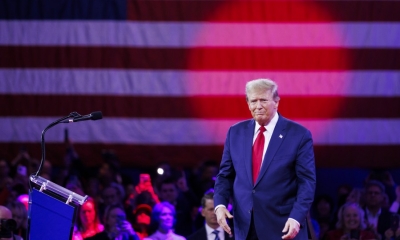U.S. Support for Israeli Worsens Gaza Humanitarian Crisis

Given the dominant influence of the pro-Israel Lobby over the White House and Congress, Washington is unable to play a constructive role in the quest for Middle East peace.
Washington’s support for Israeli invasion and expansion in Palestine has been consistent since President Harry Truman’s recognition of the state of Israel in 1948. The international community has been a witness for some eight decades.
Washington’s blank-check policy for Israel prevents a just solution to the Palestine Issue and makes the present humanitarian crisis in occupied Gaza worse.
Why does the U.S. have such a perverse policy which cuts against long-term U.S. national interests?
Pro-Israel Lobbies dominate Washington
U.S. Middle East policy is influenced by domestic politics rather than by a realistic consideration of national interest.
Logically, it would be in the interest of the United States to promote stability in the Middle East. This would entail a balanced foreign policy taking into account regional factors such as the Arab states, Iran, Turkey, and Israel.
Rather than adopting a balanced policy Washington favors Israel. This is where domestic politics comes into play.
American political scientists and sociologists produce abundant literature on U.S. domestic politics and on the influence of various lobbies and special interest groups.
Over the years, there have been books and scholarly articles on the pro-Israel Lobby. I myself wrote one published in 2009 in London entitled “Dark Crusade Christian Zionism and U.S. Foreign Policy”.

What is the U.S. pro-Israel Lobby?
Because the pro-Israel Lobby dominates the White House and Congress, it is essential to understand some basics of the U.S. policy. There is a Jewish Zionist Lobby and a Christian Zionist Lobby and both collaborate to influence a pro-Israel U.S. foreign policy.
Some definitions are in order. Zionism is a modern political ideology while Judaism is an ancient religious faith. Political Zionism took form back in 1897 at an international Zionist conference held in Basel, Switzerland. The political program agreed to the objective of establishing a Jewish ethnic state in Palestine. This objective was realized in 1948 with the establishment of the state of Israel.
The pro-Israel, or Zionist, Lobby in the U.S. gained strength over the years and is especially known as being very well organized in every U.S. state and as being very well financed. These two factors are the keys to its remarkable success.
The Christian Zionist lobby in the U.S. has more complicated roots and objectives. This lobby stems from a Christian Zionist cult created in the 1820s in the United Kingdom. It called itself “Christian” but all recognized Christian denominations around the world – Roman Catholic, Orthodox, Protestant, Coptic – say it is a heresy and has nothing to do with the ancient Christian faith.
Christian Zionism was useful to British imperial policy because it created a political base at home for imperial policy in the Middle East. Christian Zionists believed that the “Anti-Christ” was supported by three forces: Russia, China, and Persia. Thus, in effect, they were enemies of the British empire.
The Christian Zionist cultists are referred to as “Dispensationalists”. They are an apocalyptic cult which sees what they call the “End Times” of the world coming. In their scenario, Jews from around the world must be restored to Israel physically.
This ingathering of Jews in Israel then sets the stage for a giant battle called Armageddon which the “Anti-Christ” will stir up. Christian Zionists will be saved from this battle and go to Heaven. All Jews in Israel, except 144,000 who convert to Christian Zionism, will die in this Apocalypse.
The Christian Zionist “Dispensationalist” cult came to the U.S. in the 1850s from the United Kingdom. Today, cult leaders claim tens of millions of followers. Some claims are as high as 50 million Americas but perhaps 35 million is more realistic.

Zionist impact on Washington
So, how does the pro-Israel Lobby impact U.S. domestic politics?
The activities of the Jewish Zionist lobby are well known in the United States. One leading organization, American Israel Political Action Committee (AIPAC), spends tens of millions of dollars every year on campaign contributions to Senators and Congressmen. While this is perfectly legal, it is obvious that this buys influence.
Other organizations such as the Zionist Organization of America are also very active in lobbying Congress. The powerful Conference of Presidents of Jewish Organizations and the Bnai Brith are also involved in efforts to impact U.S. foreign policy.
There are several important Christian Zionist lobby organizations. The most influential is Citizens United for Israel (CUFI). In Congress, there are a number of members who themselves hold Christian Zionist beliefs. The most prominent today is the Speaker of the House of Representatives, Mike Johnson.
Geopolitics of U.S. Zionism
Jewish and Christian Zionists join forces to promote a pro-Israel U.S. foreign policy. Washington responds to this using its veto in the United Nations Security Council to protect Israel as well as to provide Israel with billions of dollars of military and other aid and diplomatic support.
It is little noticed that Christian Zionists join Jewish Zionist policy groups like the Cold War Zionist Neoconservatives in a broader geopolitical objective. That objective is to prevent major powers such as the U.S., Russia, and China from having good relations and working in concert to promote international peace and stability.
Preventing cooperative action of major powers in the Middle East prevents a peace settlement regarding Palestine. Thus, promoting negative relations between the U.S. and Russia as well as between the U.S. and China serves the pro-Israel agenda.
Given the dominant influence of the pro-Israel Lobby over the White House and Congress, Washington is unable to play a constructive role in the quest for Middle East peace. The international community must insist on the effective implementation of a just solution for Palestine.
The article reflects the author’s opinions, and not necessarily the views of China Focus.
 Facebook
Facebook
 Twitter
Twitter
 Linkedin
Linkedin
 Google +
Google +







